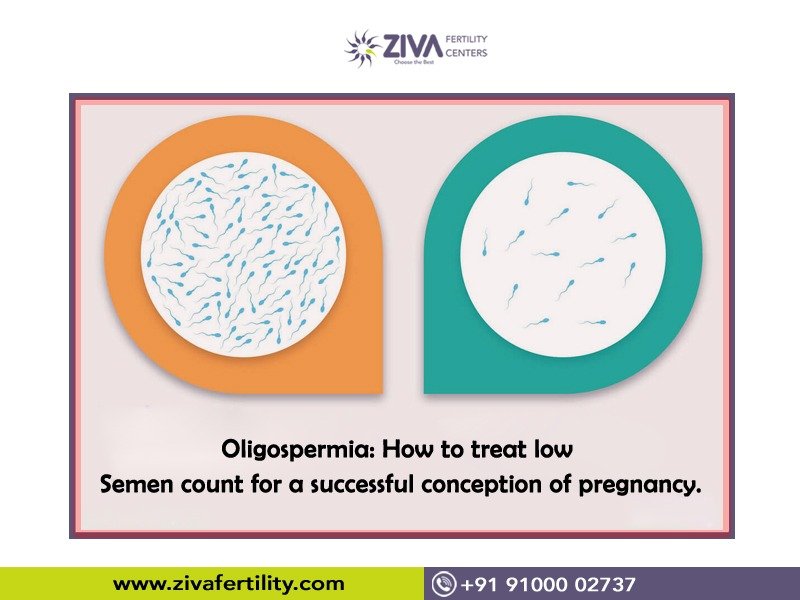When we say low sperm count, it means that in the semen released during ejaculation, there are fewer sperm than usual. Medically, this condition is called Oligospermia (ol-ih-go-SPUR-me-uh). If there is no sperm in the semen, it is medically called Azoospermia. One is diagnosed with Oligospermia if fewer than 15 million sperm per millilitre of semen. Though the chances of one of your sperm fertilizing your partner’s egg decrease nonetheless, many men with a low sperm count can still father a child. In this blog, we will learn about treatment methodologies for low sperm count and how you can improve your chances of naturally fathering a child.
Symptoms of low sperm count
Here are the physical manifestations of a low sperm count:-
- Low sex drive or and erectile dysfunction (difficulty maintaining an erection)
- Inflammation, i.e. pain, swelling or a lump in the testicle area

Causes of low sperm count
For a healthy production of sperm, the testicles (testes), the hypothalamus and pituitary glands — organs in your brain that produce hormones that trigger sperm production should function normally. Sperm is produced in the testicles, and delicate tubes transport them until they mix with semen and are ejaculated out of the penis. If there are issues anywhere in this entire process, it can cause a low sperm count. Some of the reasons for this medical condition are:-
- Varicocele – Swelling of the veins that drain the testicle.
- Infection – Infections interfere with sperm production or can block the passages that carry the sperm. These include inflammation of the epididymis (epididymitis), testicles (orchitis), gonorrhoea or HIV.
- Ejaculation Issues- During orgasm, if the semen enters the bladder instead of emerging out of the tip of the penis, it is retrograde ejaculation. Diabetes, spinal injuries, and bladder, prostate or urethra surgery can cause retrograde ejaculation or lack of ejaculation.
- Antibodies that attack sperm- Anti-sperm antibodies mistakenly identify sperm as harmful invaders and attempt to destroy them.
- Tumours- Cancers or non-malignant tumours directly affect the male reproductive organs. Treatments to cure tumours, such as surgery, radiation or chemotherapy, can affect male fertility.
- Overheating the testicles. Relaxing in a sauna or hot bath once in a while is good, but frequent usage can temporarily impair sperm count. Long hours of sitting, wearing tight clothing or working on a laptop computer for long periods will increase the temperature and slightly reduce sperm production.
- Industrial chemicals.
- Heavy metal exposure.
- Drug use.
- Alcohol use.
- Tobacco smoking.
- Emotional stress.
- Depression.
- Weight.
Treatment for Oligospermia
Treatments for low sperm count include:
- Surgery. Varicocele or an obstructed vas deferens can be fixed via surgery. Any earlier vasectomies can be reversed through surgery. If sperm is absent in the ejaculate, sperm is retrieved directly from the testicles or epididymis using sperm retrieval techniques.
- Treating infections. Antibiotics are an option to cure an infection of the reproductive tract, but they don’t guarantee to restore fertility.
- Treatments for sexual problems. There could be both medical and emotional issues which could cause issues in intercourse. In such cases, therapy along with medication will help improve fertility.
- Hormonal treatments. If infertility is caused by high or low levels of certain hormones or problems with how the body uses hormones, your doctor might recommend hormone replacement
- .

- Assisted reproductive technology (ART). ART is the most sought methodology. Various techniques are applied based on the root cause. In case of low sperm count, sperm is collected via surgical extraction or from donor individuals, depending on the specific situation and wishes. The extracted sperm is inserted into the female genital tract or used for IVF or intracytoplasmic sperm injection.
- Donor sperm. Rarely, when male fertility problems can’t be treated, you and your partner can consider using sperm from a donor or adopting a child.
Protecting Male Fertility
One should adopt the below practises, protecting their male fertility.
- Don’t smoke.
- Limit or abstain from alcohol.
- Steer clear of illicit drugs.
- Tell your doctor if any medicines you are taking can affect sperm count.
- Maintain a healthy weight.
- Avoid wearing tight clothes, and do not keep electronic gadgets on your lap.
- Manage stress.
- Avoid exposure to pesticides, heavy metals and other toxins.
We at ZIVA fertility centers are very open to all possible treatments. One can discuss with us without inhibitions, and we will listen to you with compassion and give the best possible solution. Please visit our website https://zivafertility.com/ or contact us at +91-9100002737, +91-9392834024, or Info@zivafertility.com.
















